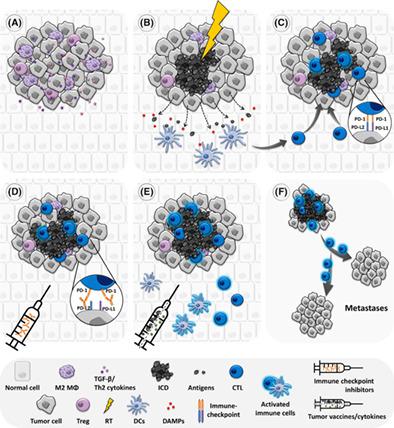当前位置:
X-MOL 学术
›
STEM CELLS
›
论文详情
Our official English website, www.x-mol.net, welcomes your
feedback! (Note: you will need to create a separate account there.)
Radiotherapy and the immune system: More than just immune suppression
STEM CELLS ( IF 4.0 ) Pub Date : 2021-05-07 , DOI: 10.1002/stem.3391 Michael Rückert 1, 2, 3 , Ann-Sophie Flohr 1, 2, 3 , Markus Hecht 2, 3, 4 , Udo S Gaipl 1, 2, 3, 4
STEM CELLS ( IF 4.0 ) Pub Date : 2021-05-07 , DOI: 10.1002/stem.3391 Michael Rückert 1, 2, 3 , Ann-Sophie Flohr 1, 2, 3 , Markus Hecht 2, 3, 4 , Udo S Gaipl 1, 2, 3, 4
Affiliation

|
Radiotherapy (RT) is still one of the standard cancer therapies, with up to two third of all cancer patients with solid tumors being irradiated in the course of their disease. The aim of using ionizing radiation in fractionated treatment schedules was always to achieve local tumor control by inducing DNA damage which can be repaired by surrounding normal tissue but leads to cell death in tumor cells. Meanwhile, it is known that RT also has immunological effects reshaping the tumor microenvironment. Nevertheless, RT alone often fails to elicit potent antitumor immune responses as these effects can be immunostimulatory as well as immunosuppressive. Here, we discuss how immunotherapies can be exploited in combined therapies to boost RT-induced antitumor immune responses or to counteract preexisting and RT-mediated immunosuppression to improve local and systemic tumor control. Furthermore, we highlight some parameters of radioimmunotherapies (RITs) which are under investigation for potential optimizations and how RIT approaches are tested in first phases II and III trials. Finally, we discuss how RT might affect normal and cancer stem cells.
中文翻译:

放射治疗和免疫系统:不仅仅是免疫抑制
放射疗法 (RT) 仍然是标准的癌症疗法之一,多达三分之二的实体瘤癌症患者在其病程中接受了放射治疗。在分次治疗方案中使用电离辐射的目的始终是通过诱导 DNA 损伤来实现局部肿瘤控制,DNA 损伤可以被周围正常组织修复,但会导致肿瘤细胞中的细胞死亡。同时,众所周知,放疗还具有重塑肿瘤微环境的免疫学作用。然而,单独的 RT 通常不能引发有效的抗肿瘤免疫反应,因为这些效应可以是免疫刺激性的,也可以是免疫抑制性的。这里,我们讨论了如何在联合疗法中利用免疫疗法来增强 RT 诱导的抗肿瘤免疫反应或抵消先前存在的和 RT 介导的免疫抑制,以改善局部和全身肿瘤控制。此外,我们强调了放射免疫疗法 (RIT) 的一些参数,这些参数正在研究中以进行潜在的优化,以及如何在第一阶段 II 和 III 试验中测试 RIT 方法。最后,我们讨论了放疗如何影响正常和癌症干细胞。
更新日期:2021-05-07
中文翻译:

放射治疗和免疫系统:不仅仅是免疫抑制
放射疗法 (RT) 仍然是标准的癌症疗法之一,多达三分之二的实体瘤癌症患者在其病程中接受了放射治疗。在分次治疗方案中使用电离辐射的目的始终是通过诱导 DNA 损伤来实现局部肿瘤控制,DNA 损伤可以被周围正常组织修复,但会导致肿瘤细胞中的细胞死亡。同时,众所周知,放疗还具有重塑肿瘤微环境的免疫学作用。然而,单独的 RT 通常不能引发有效的抗肿瘤免疫反应,因为这些效应可以是免疫刺激性的,也可以是免疫抑制性的。这里,我们讨论了如何在联合疗法中利用免疫疗法来增强 RT 诱导的抗肿瘤免疫反应或抵消先前存在的和 RT 介导的免疫抑制,以改善局部和全身肿瘤控制。此外,我们强调了放射免疫疗法 (RIT) 的一些参数,这些参数正在研究中以进行潜在的优化,以及如何在第一阶段 II 和 III 试验中测试 RIT 方法。最后,我们讨论了放疗如何影响正常和癌症干细胞。











































 京公网安备 11010802027423号
京公网安备 11010802027423号